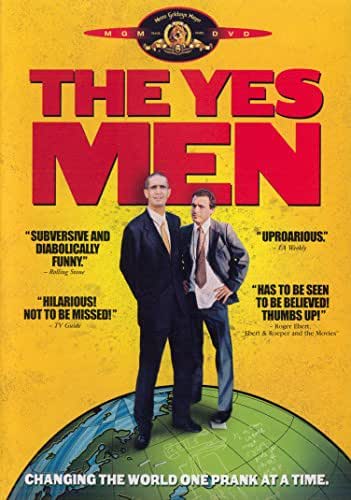**½/**** Image A- Sound A- Extras B
directed by Chris Smith, Dan Ollman and Sarah Price
by Travis Mackenzie Hoover The key scene in The Yes Men comes when pranksters Michael Bonanno and Andy Bichelbaum suddenly stop to ask the question: is it more fun to engage in satire than in regular protest? They quickly agree that it is, but the issue has always been hanging around their flamboyant efforts to impersonate WTO spokespeople and tell the ridiculous truth about the organization's activities. And although it's obvious that satire is indeed more fun, its effectiveness is called into question over and over again when it becomes apparent that nobody really appreciates the joke. If one can crash a conference and throw outrageous but true accusations at globalization and not get thrown out, was anything truly subverted? The film mounts a good case for the entertainment factor of this shtick without backing up its larger claims as a lefty consciousness-raiser, a process far more arduous than these Yes Men let on.
Bonanno and Bichelbaum stumbled into something big when they created a website trashing the WTO that looked nearly identical to the entity's actual webpage: it seemed that lazy organizers and press agents would invite their spokespeople to conferences and press ops without realizing they'd been had. The pair then hatched the idea of posing as speakers who would be more than happy to state the true agenda of the organization, doing it with such outrageous style that nobody could possibly miss their point. To their surprise, almost nobody at the various symposia catches on: neither a pro-slavery slant (complete with footage from Birth of a Nation) nor a ridiculous phallic costume blows their cover; the representatives simply absorb the "information" and move on. But the theory is that the press will cover them, raising awareness of the WTO's dastardly activities.
How much you get out of The Yes Men hinges on whether you accept the veracity of that last sentence. The film itself is concerned with medium as opposed to message, following the hoaxers and their fellow travellers as they design costumes, develop strategy, and laugh at their deserving victims' expense–it's up to inserts of Michael Moore and others to remind us that, yes, the WTO is indeed fixing it for the Western rich and powerful to the detriment of the poor and the Third World. Yet it's never fully established how effective these pranks are beyond their obvious conceptual brilliance. As the corporate elite seem to see nothing wrong and the press reduces most of their acts to soundbites, I doubt that it does much beyond comforting those already on their side. The one time their faux-capitalist bile causes a ruckus is in front of an audience of students who pelt them with inflatable globes–a sure sign they didn't really need the message.
The Yes Men is very funny much of the time, and you want to applaud its subjects for daring to mess so blatantly with the public order of things. Still, I admired their wit and chutzpah more than their tactics: they may penetrate the ranks of the enemy, but they don't really hammer the point home. Even Michael Moore is better at inciting you to act, since he's less easy to write off as a college boy playing a game of stick-it-to-the-man. Though I've endured the company of enough humourlessly alienating radicals to know that levity is an important part of the package, here the pendulum swings too far the other way: you come away thinking nothing more than that satire sure is fun. It is fun, of course, but without a gravity underlying it all, that's all it is, whether you have the right attitude or not.
THE DVDMGM's DVD release of The Yes Men looks wonderful considering the film's humble origins. While the 1.85:1, 16×9-enhanced image belies the limitations of digital-to-film-to-digital, the problems are nowhere near as pronounced as past efforts: colours are surprisingly vivid and fine detail is more or less remarkable. The Dolby 2.0 surround sound is likewise unexpectedly good: if channel separation is predictably unimpressive, the potency and sharpness of the mix is startling for documentary-location sound.
Extras begin with a commentary from Bonanno and Bichelbaum, accompanied by co-directors Chris Smith, Dan Ollman, and Sarah Price. The filmmakers largely serve as interviewers, pressing for additional facts from the Yes Men and joining them in production in-jokes. While all involved do a fairly good job of filling in background detail (and growling along with the MGM lion), they reveal one telling suppression: Bonanno's reprogramming of "The Sims" computer game to include a gay joke started out as a stress-reliever but was then "spun" into political subversion after it hit the press. Strange behaviour for a radical. Four deleted scenes are confined to peripheral goofs (a fellow traveller playing some sort of woodwind instrument) and superfluous comment (Bonanno and Bichelbaum marvelling at getting away with everything). MGM propaganda plus trailers for Code 46, Wicker Park, When Will I Be Loved, Undertow, Species III, and Confessions of an American Girl round out the disc.
82 minutes; R; 1.85:1 (16×9-enhanced); English Dolby Surround; CC; English, French, Spanish subtitles; DVD-9; Region One; MGM




